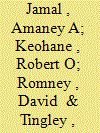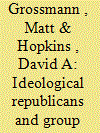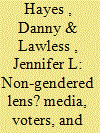|
|
|
Sort Order |
|
|
|
Items / Page
|
|
|
|
|
|
|
| Srl | Item |
| 1 |
ID:
140187


|
|
|
|
|
| Summary/Abstract |
Systematic investigation of attitudes expressed in Arabic on Twitter towards the United States and Iran during 2012–13 shows how the analysis of social media can illuminate the politics of contemporary political discourses and generates an informative analysis of anti-Americanism in the Middle East. We not only analyze overall attitudes, but using a novel events-based analytical strategy, we examine reactions to specific events, including the removal of Mohamed Morsi in Egypt, the Innocence of Muslims video, and reactions to possible U.S. intervention in Syria. We also examine the Boston Marathon bombings of April 2013, in which the United States suffered damage from human beings, and Hurricane Sandy, in which it suffered damage from nature. Our findings reinforce evidence from polling that anti-Americanism is pervasive and intense, but they also suggest that this animus is directed less toward American society than toward the impingement of the United States on other countries. Arabic Twitter discourses about Iran are at least as negative as discourses about the United States, and less ambivalent. Anti-Americanism may be a specific manifestation of a more general phenomenon: resentment toward powerful countries perceived as interfering in national and regional affairs.
|
|
|
|
|
|
|
|
|
|
|
|
|
|
|
|
| 2 |
ID:
140185


|
|
|
|
|
| Summary/Abstract |
Non-democratic regimes have increasingly moved beyond merely suppressing online discourse, and are shifting toward proactively subverting and co-opting social media for their own purposes. Namely, social media is increasingly being used to undermine the opposition, to shape the contours of public discussion, and to cheaply gather information about falsified public preferences. Social media is thus becoming not merely an obstacle to autocratic rule but another potential tool of regime durability. I lay out four mechanisms that link social media co-optation to autocratic resilience: 1) counter-mobilization, 2) discourse framing, 3) preference divulgence, and 4) elite coordination. I then detail the recent use of these tactics in mixed and autocratic regimes, with a particular focus on Russia, China, and the Middle East. This rapid evolution of government social media strategies has critical consequences for the future of electoral democracy and state-society relations.
|
|
|
|
|
|
|
|
|
|
|
|
|
|
|
|
| 3 |
ID:
140183


|
|
|
|
|
| Summary/Abstract |
This address asks how we got to today’s politics in America; a politics of polarized political parties engaged in close political competition in a system of checks and balances. The result has often been divided control of government and an apparent inability to address major political problems. This address develops the historical foundation for these characteristics. Historically, the Founding period set the stage of separated powers and the first party system. America developed a market economy, a middle class, and a mass-based set of parties in the Antebellum period. Through the Progressive era, nation-wide reforms led to a more democratic but increasingly candidate-centered politics in the North, and the establishment of Jim Crow politics in the South. The post-War period saw the full development of candidate-centered elections. While the breakup of Jim Crow due to the Civil Rights and Voting Rights Acts in the mid-1960s ended Jim Crow and made possible a competitive party system in the South, the later was delayed until the full implementation of the Republican’s “southern strategy” in 1980 and beyond. This set in motion the partisan polarization of today, to combine with separated powers to create what many refer to as the “current” political “dysfunction.”
|
|
|
|
|
|
|
|
|
|
|
|
|
|
|
|
| 4 |
ID:
140190


|
|
|
|
|
| Summary/Abstract |
Scholarship commonly implies that the major political parties in the United States are configured as mirror images to each other, but the two sides actually exhibit important and underappreciated differences. The Republican Party is primarily the agent of an ideological movement whose supporters prize doctrinal purity, while the Democratic Party is better understood as a coalition of social groups seeking concrete government action. This asymmetry is reinforced by American public opinion, which favors left-of-center positions on most specific policy issues yet simultaneously shares the general conservative preference for smaller and less active government. Each party therefore faces a distinctive governing challenge in balancing the unique demands of its base with the need to maintain broad popular support. This foundational difference between the parties also explains why the rise of the Tea Party movement among Republicans in recent years has not been accompanied by an equivalent ideological insurgency among Democrats.
|
|
|
|
|
|
|
|
|
|
|
|
|
|
|
|
| 5 |
ID:
140188


|
|
|
|
|
| Summary/Abstract |
Do voters regard male and female candidates equally? Does apparent religiosity of candidates help or hurt their electoral chances? Where biases exist, what explains them? We present a novel explanation of political bias, drawing from role congruity theory. It posits that political contexts shape citizens' perceptions of qualities that make a “capable leader,” which subsequently drives their willingness to vote for candidates. Evidence from a survey experiment embedded in the 2012 Tunisian Post-Election Survey demonstrates that this theory explains biases based on gender and religiosity better than dominant modernization and social identity theories. Moreover, these mechanisms are also likely to drive political biases related to other features and in other countries. This has important implications for policymakers aiming to reduce political biases in Tunisia, the MENA, or globally. It should encourage them to pay careful attention to stereotyped traits of underrepresented groups and successful leaders, and to use institutional solutions (e.g., electoral quotas) to shape expectations about underrepresented groups and leadership.
|
|
|
|
|
|
|
|
|
|
|
|
|
|
|
|
| 6 |
ID:
140189


|
|
|
|
|
| Summary/Abstract |
Much research in the study of U.S. politics has argued that female candidates for elected office are treated differently—and often worse—than male candidates in the press and by the public. Although these patterns do not doom women to electoral failure, they raise a formidable series of obstacles that often complicate women’s path to elective office, slowing the move toward gender parity in representation. Broad changes to the American political landscape, as well as methodological limitations of previous work, however, suggest the need for an updated assessment. We rely on a detailed content analysis of local newspaper coverage from nearly 350 U.S. House districts and nationally representative survey data from the 2010 midterms to provide a comprehensive evaluation of whether women experience a more hostile campaign environment than do men. We find that candidate sex does not affect journalists’ coverage of, or voters’ attitudes toward, the women and men running for office in their districts. Rather, reporters’ portrayals and citizens’ assessments of candidates stem primarily from partisanship, ideology, and incumbency, not the sex of the candidate. Although our results differ from much of the existing literature, we regard them as a valuable point of departure for answering pressing questions about gender and representation in contemporary politics, both in an American and comparative context.
|
|
|
|
|
|
|
|
|
|
|
|
|
|
|
|
| 7 |
ID:
140184


|
|
|
|
|
| Summary/Abstract |
Recent studies of autocratic liberalization adopt a rationalist approach in which autocrats’ motives and styles of reasoning are imputed or deduced. By contrast, I investigate these empirically. I focus on liberal social engineering in the Persian Gulf, where authoritarian state efforts to shape citizen hearts and minds conform incongruously to liberal ideals of character. To explain this important but under-studied variant on autocratic liberalization, I present evidence from rare palace ethnography in the United Arab Emirates, including analysis of the jokes and stories ruling elites tell behind closed doors and regular interviews with a ruling monarch. I find that autocrats’ deeply personal experiences in the West as young men and women supplied them with stylized ideas about how modern, productive peoples ought to act and how their own cultures underperform. The evidence also reveals that such experiences can influence autocrats, even years later, leading them to trust in Western-style liberal social engineering as the way forward, despite the risks. Ethnographic findings challenge the contemporary scholarly stereotype of the autocrat as a super-rational being narrowly focused on political survival, illustrating how memory and emotion can also serve as important influences over reasoning and can drive liberal change.
|
|
|
|
|
|
|
|
|
|
|
|
|
|
|
|
|
|
|
|
|